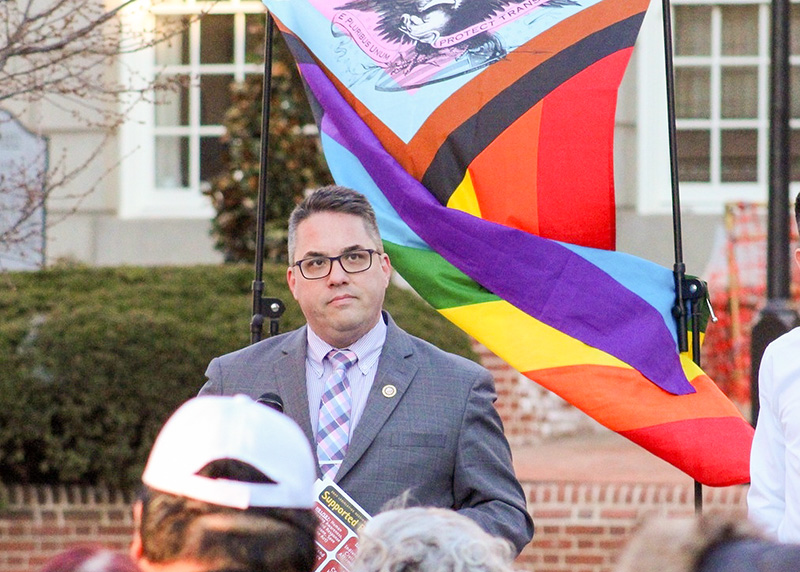Judge Rules Insurers Don’t Have to Cover PrEP, STD Screenings
Judge Reed O'Connor strikes down Affordable Care Act requirements that insurers cover preventive screenings and services at no additional cost.

A federal judge in Texas has blocked part of the Affordable Care Act requiring health insurance plans to cover a host preventive care measures, including pre-exposure prophylaxis against HIV (PrEP).
On Thursday, U.S. District Judge Reed O’Connor, of the Northern District of Texas, ruled that insurers do not have to comply with recommendations made by the U.S. Preventive Services Task Force, which is tasked with determining which preventive care treatments insurers should cover, with no additional cost burden to patients.
O’Connor issued an injunction blocking the federal government from trying to enforce those recommendations, ruling that the task force was illegally appointed because its members must be directly appointed by the president as required by the Constitution’s Appointment Clause. The decision applies to any and all recommendations issued on or after March 23, 2010 — the day on which the Affordable Care Act was signed into law, reports CNN.
O’Connor previously ruled last September that requiring PrEP to be covered under the Affordable Care Act violated the religious freedom rights of employers who object to subsidizing, through the insurance coverage provided to their employees, treatments or services that “encourage homosexual behavior, prostitution, sexual promiscuity and intravenous drug use.”
But Thursday’s ruling expands upon that decision, finding that insurance companies are no longer required to cover any other services that the task force recommended be provided at no cost, including lung, skin, and colorectal cancer screenings, the use of statins to prevent cardiovascular disease, diabetes screenings, depression screenings, pregnancy-related services, and STD screenings and counseling, reports Reuters.
The lawsuit — which marks yet another attack on the Affordable Care Act — was brought by the conservative America First Legal Foundation on behalf of a group of individuals and Christian business owners in Texas.
The Christian business owners objected to having to pay insurance premiums for policies covering services they believe encourage behavior that is contrary to their personal moral and religious beliefs, particularly with regard to premarital or extramarital sex, while the individuals argued that they shouldn’t be forced to pay for preventive care services they weren’t personally using.
O’Connor, a George W. Bush appointee, previously ruled in 2018 that the entire Affordable Care Act was unconstitutional and that all of its provisions no longer held the force of law. That decision was later overturned by the U.S. Supreme Court.
O’Connor did reject the Texas plaintiff’s claims that their religious freedom was violated by the ACA’s “no-cost coverage” mandates requiring for vaccines, some women’s health care preventive care treatments, and services for infants and children. It remains unclear whether the plaintiffs will appeal those aspects of the decision, potentially putting insurance coverage for additional preventive services at risk.
The U.S. Department of Justice is expected to appeal Thursday’s ruling, and has the option to ask that O’Connor’s decision be stopped from taking effect while the department’s appeal works its way through the courts.
White House Press Secretary Karine Jean-Pierre called the case “yet another attack on the Affordable Care Act” and said that the Justice Department and the Department of Health and Human Services are reviewing the decision.
Last July, more than 60 major medical groups, including the American Medical Association, issued a statement warning that rulings like the one issued by O’Connor could jeopardize access to preventive care for millions of Americans, leading to them unnecessarily contracting diseases and leading to worse overall health outcomes.
Andrew Twinamatsiko, the associate director of the O’Neill Institute for National and Global Health Law at Georgetown University, told CNN that the ruling, if not reversed, will force patients to pay more out of pocket for services that are no longer covered by insurance, meaning people who cannot afford to bear such a financial burden are more likely to forego such services and risk more long-term negative health outcomes.
According to statistics from the the U.S. Department of Health and Human Services, as of January 2022, more than 150 million Americans had private insurance that provided coverage for preventive services, with 20 million Medicaid recipients and 61 million Medicare beneficiaries also benefitting from those same services.
HIV prevention groups and LGBTQ organizations blasted O’Connor’s decision as one that would endanger more lives, particularly when it comes to connecting at-risk individuals with PrEP in order to prevent HIV transmission.
“While not surprised by Judge O’Connor’s decision, which will immediately impact coverage of HIV testing, hepatitis B and C testing, along with PrEP, it is imperative that these critical preventive services must continue for the health of our nation,” Carl Schmid, the executive director of the HIV+Hepatitis Policy Institute said in a statement.
“Preventive services are all critical and well-established medical services. The decision to single out PrEP is based on a deep discrimination against people who can benefit from it and would greatly impede our efforts to reduce HIV cases,” Schmid added. “On behalf of the HIV and hepatitis communities, we look forward to participating in the appeals process of the judge’s decision so that his destructive decision does not stand. While the appeals process moves forward, we call on health insurers to act on their own and continue to cover these preventive services without cost-sharing for the benefit of their enrollees.”
Kelley Robinson, the president of the Human Rights Campaign, called the ruling a “slap in the face to every person receiving healthcare subject to the Affordable Care Act” and called on insurers to continue offering coverage for preventive services on an individual basis to ensure that there is no disruption in care.
“Many Americans, particularly LGBTQ+ people, communities of color, and other marginalized communities, continue to face societal and economic barriers that prevent them from accessing quality healthcare,” she noted. “The disproportionate impact of HIV on Black and Latinx gay and bisexual men and transgender women is a health inequity and civil rights injustice that demands more access to preventive services and medicine such as PrEP — which, when taken as prescribed, reduces the chance of HIV acquisition during sex by 99% — not less. Insurance providers must continue covering the full range of preventive services at no cost to their patients to maintain safeguards against compromising enrollees’ health.”
Ben Klein, the senior director of litigation and HIV law for GLBTQ Legal Advocates and Defenders, lamented the impact the ruling will have on Americans who, depending on their insurer, may no longer have the cost of preventive screenings covered. He also warned that the finding that PrEP coverage violates some policyholders’ religious freedom will result in higher transmission rates as patients balk at the price of out-of-pocket costs and ultimately decide to avoid them.
“Today’s order in Braidwood v. Becerra will have direct and devastating consequences for efforts to combat the HIV epidemic,” Klein noted. “We have a safe, approved therapy, PrEP, that is nearly 100% effective at preventing transmission of HIV but that remains underutilized, particularly among Black and Latinx communities. Ending the requirement that insurers cover PrEP with no cost-sharing will increase new HIV diagnoses and exacerbate racial health disparities when what we need is to be ensuring more people have access to PrEP.
“Copays and deductibles deter people from accessing healthcare,” Klein added. “Make no mistake, we will see more HIV transmission as a result of this ruling.”
Support Metro Weekly’s Journalism
These are challenging times for news organizations. And yet it’s crucial we stay active and provide vital resources and information to both our local readers and the world. So won’t you please take a moment and consider supporting Metro Weekly with a membership? For as little as $5 a month, you can help ensure Metro Weekly magazine and MetroWeekly.com remain free, viable resources as we provide the best, most diverse, culturally-resonant LGBTQ coverage in both the D.C. region and around the world. Memberships come with exclusive perks and discounts, your own personal digital delivery of each week’s magazine (and an archive), access to our Member's Lounge when it launches this fall, and exclusive members-only items like Metro Weekly Membership Mugs and Tote Bags! Check out all our membership levels here and please join us today!


































You must be logged in to post a comment.